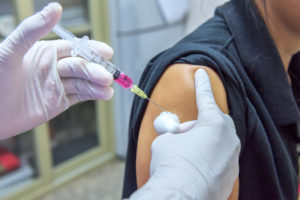Flu Prevention
Ok, I think I have the flu but how did I get it?

Washing your hands is a quick and easy way to lower your risk of catching or spreading the flu.
You catch the flu when someone around you coughs or sneezes. Or when you touch something with the virus on it, elevator buttons, doorknobs phones etc. and then you touch your nose or mouth.
How do I prevent catching the flu?
The single best way to prevent seasonal flu is to get vaccinated each year, but good health habits like covering your cough and washing your hands often can help stop the spread of germs and prevent respiratory illnesses like the flu. There also are flu antiviral drugs that can be used to treat and prevent flu.
We may not be able to cure the flu, but we can prevent its spread. Do not risk getting the flu or making your case more severe by going to the hospital.
Why should people get vaccinated against the flu?
Influenza is a potentially serious disease that can lead to hospitalization and sometimes even death. Every flu season is different, and influenza infection can affect people differently, but millions of people get the flu every year, hundreds of thousands of people are hospitalized and thousands or tens of thousands of people die from flu-related causes every year. An annual seasonal flu vaccine is the best way to help protect against flu.
How do flu vaccines work?

Get Your Flu Shot this season
Flu vaccines cause antibodies to develop in the body about two weeks after vaccination. These antibodies provide protection against infection with the viruses that are in the vaccine.
The seasonal flu vaccine protects against the influenza viruses that research indicates will be most common during the upcoming season.
Who should get vaccinated this season?
Everyone 6 months of age and older should get a flu vaccine every season. This recommendation has been in place since February 24, 2010 when CDC’s Advisory Committee on Immunization Practices (ACIP) voted for “universal” flu vaccination in the United States to expand protection against the flu to more people.
When should I get vaccinated?
You should get a flu vaccine before flu begins spreading in your community. It takes about two weeks after vaccination for antibodies that protect against flu to develop in the body. CDC recommends that people get a flu vaccine by the end of October. Getting vaccinated later, however, can still be beneficial and vaccination should continue to be offered throughout the flu season, even into January or later.
What ages need 2 doses of flu vaccine?
Children who need two doses of vaccine to be protected should start the vaccination process sooner, because the two doses must be given at least four weeks apart. If your child is younger than age 9 years and is getting the flu vaccine for the first time or has only had one dose of the vaccine in total prior to July 1, 2018, plan for two doses given at least four weeks apart. Please consult your child’s pediatrician.
Why do I need a flu vaccine every year?
A flu vaccine is needed every season for two reasons. First, the body’s immune response from vaccination declines over time, so an annual vaccine is needed for optimal protection. Second, because flu viruses are constantly changing, the formulation of the flu vaccine is reviewed each year and updated as needed to keep up with changing flu viruses. For the best protection, everyone 6 months and older should get vaccinated annually.
Does flu vaccine work right away?
No. It takes about two weeks after vaccination for antibodies to develop in the body and provide protection against influenza virus infection. That’s why it’s better to get vaccinated by the end of October, before the flu season really gets under way.
Can I get seasonal flu even though I got a flu vaccine this year?

Know The Flu Symptoms and Get Your Flu Shot!
Yes. It’s possible to get sick with flu even if you have been vaccinated (although you won’t know for sure unless you get a flu test). This is possible for the following reasons:
- You may be exposed to a flu virus shortly before getting vaccinated or during the period that it takes the body to gain protection after getting vaccinated. This exposure may result in you becoming ill with flu before the vaccine begins to protect you. (Antibodies that provide protection develop in the body about 2 weeks after vaccination.)
- You may be exposed to a flu virus that is not included in the seasonal flu vaccine. There are many different flu viruses that circulate every year. A flu vaccine is made to protect against the three or four flu viruses that research suggests will be most common.
- Unfortunately, some people can become infected with a flu virus a flu vaccine is designed to protect against, despite getting vaccinated. Protection provided by flu vaccination can vary widely, based in part on health and age factors of the person getting vaccinated. In general, a flu vaccine works best among healthy younger adults and older children. Some older people and people with certain chronic illnesses may develop less immunity after vaccination. Flu vaccination is not a perfect tool, but it is the best way to protect against flu infection.
What protection does the flu vaccine provide if I do get sick with flu?
Some people who get vaccinated may still get sick. However, flu vaccination has been shown in some studies to reduce severity of illness in people who get vaccinated but still get sick. A 2017 study showed that flu vaccination reduced deaths, intensive care unit (ICU) admissions, ICU length of stay, and overall duration of hospitalization among hospitalized flu patients. Another study in 2018 showed that a vaccinated adult who was hospitalized with flu was 59 percent less likely to be admitted to the Intensive Care Unit than someone who had not been vaccinated.
Who can receive Fluzone High-Dose Quadrivalent?
Per the CDC, in the United States, Fluzone High-Dose Quadrivalent is licensed only for persons aged 65 years and older. Fluzone High-Dose Quadrivalent is not recommended for persons with a history of severe allergic reaction to the vaccine or to ingredients other than eggs. Information about vaccine ingredients is located in package inserts from each manufacturer.